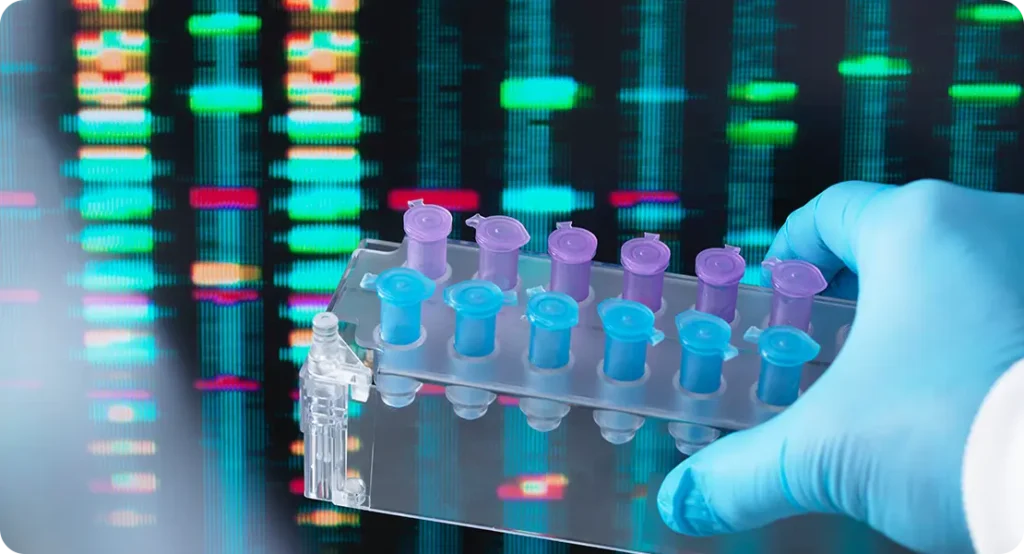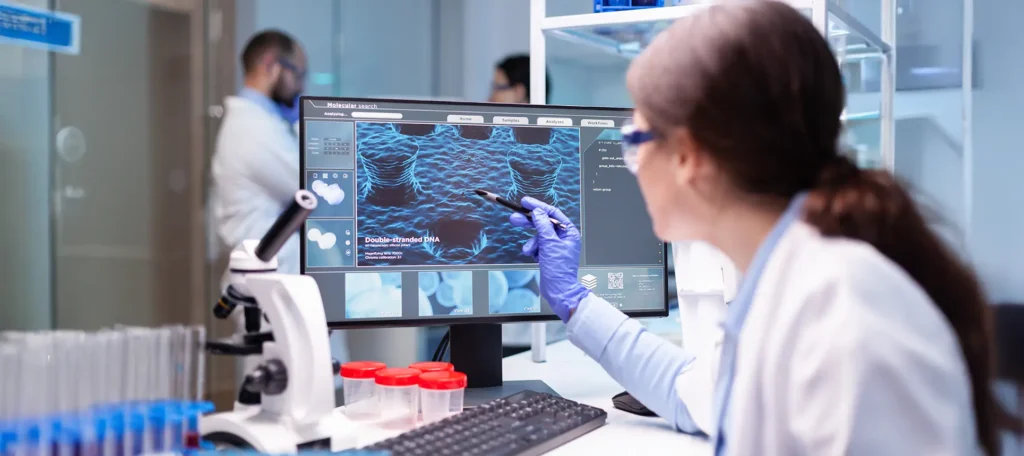Imagine if your skincare routine or treatment plan was designed specifically for your skin not based on guesswork, but on scientific data from your genes, skin microbiome, and even artificial intelligence.
This is no longer futuristic thinking. Dermatology is entering a new era where data, DNA, and digital imaging are revolutionising how we understand and treat skin.
Today, dermatologists can use advanced genetic insights and AI-powered digital skin analysis to predict your skin’s behaviour, identify risks before they appear, and tailor precise, evidence-based treatment plans that are as unique as your fingerprint.
In this article, we’ll explore how these cutting-edge technologies are reshaping personalised dermatology and what this means for the future of skin health.
What Is Personalised Dermatology?
Personalised dermatology, sometimes called precision dermatology, focuses on tailoring skincare and treatment plans to an individual’s unique biological, genetic, and lifestyle profile.
Traditionally, dermatology treatments were based on visual assessment and patient-reported symptoms. While that approach remains vital, modern technology is adding new layers of insight.
Now, dermatologists can analyse genetic markers, environmental factors, and digital skin data to design plans that are:
- More accurate
- More preventive
- More effective over the long term
The goal isn’t just to treat what’s visible it’s to understand why your skin behaves the way it does.
The Genetic Foundations of Your Skin

Your DNA determines more than just your eye or hair colour. It also plays a crucial role in how your skin ages, reacts to sunlight, and responds to treatments.
Recent advances in genetic testing allow dermatologists to examine small variations in your genes, known as polymorphisms, that influence skin function.
Key Genetic Factors Affecting Skin Health:
- Collagen Production Genes: Influence firmness, elasticity, and wrinkle formation.
- Antioxidant Defence Genes: Affect your ability to fight free radicals and oxidative stress.
- Inflammation Genes: Determine how sensitive your skin is to irritation or redness.
- Pigmentation Genes: Impact melanin production and risk of hyperpigmentation.
- UV Response Genes: Reveal your susceptibility to sun damage or premature ageing.
By understanding your genetic blueprint, a dermatologist can recommend specific treatments, ingredients, or preventive strategies that align with your body’s natural tendencies.
How Genetic Testing Works in Dermatology
The process is simple, painless, and highly informative.
- Sample Collection: Usually a cheek swab or saliva sample is taken.
- DNA Analysis: The sample is analysed in a laboratory to identify key skin-related genetic markers.
- Report Generation: The data is translated into insights on skin ageing, sensitivity, hydration, pigmentation, and more.
- Treatment Customisation: A dermatologist reviews the findings and designs a tailored skincare or treatment plan.
For instance, if your results show reduced collagen synthesis, your dermatologist might recommend collagen-stimulating procedures like microneedling or radiofrequency.
If you’re genetically prone to hyperpigmentation, your skincare could prioritise antioxidants and sun protection.
Moving Beyond Skin Type: The End of One-Size-Fits-All
For years, skincare has revolved around categories like “oily,” “dry,” or “sensitive.” While helpful, these labels only scratch the surface.
Genetic testing and digital diagnostics reveal a more complex picture showing how your skin behaves at a cellular and molecular level.
This means two people with “dry” skin might have completely different underlying causes:
- One could have a lipid metabolism issue.
- The other might have a barrier dysfunction.
Personalised dermatology eliminates the guesswork by identifying these subtle but crucial differences.
The Rise of Digital Skin Analysis

Alongside genetics, AI-powered digital skin analysis has become a game-changer in modern dermatology.
These systems use high-resolution imaging and artificial intelligence to evaluate skin texture, tone, hydration, and pore structure with incredible precision far beyond what the human eye can detect.
Using advanced software, dermatologists can track skin changes over time, monitor treatment progress, and even predict how your skin will age under different environmental or lifestyle conditions.
How Digital Skin Analysis Works
At clinics such as London Dermatology Centre, dermatologists are increasingly incorporating advanced imaging technologies into routine consultations.
Here’s how the process typically works:
- High-Definition Imaging: A specialised device captures detailed photographs of your face under multiple lighting conditions (including UV and polarised light).
- AI Evaluation: Artificial intelligence analyses features such as wrinkles, pigmentation, pores, redness, and hydration levels.
- Data Interpretation: The system compares your results with large dermatological databases to provide objective measurements and trend predictions.
- Treatment Planning: Your dermatologist uses this data to fine-tune treatment options and skincare routines.
Combining Genetics and AI: A Powerful Duo
When genetic analysis and AI diagnostics are used together, they create a complete picture of your skin health combining your internal biology with your external condition.
This synergy allows dermatologists to:
- Predict how your skin will respond to specific treatments.
- Identify underlying risks, such as early pigmentation or inflammatory tendencies.
- Personalise procedures based on your genetic resilience or sensitivity.
- Monitor progress with measurable data, not just visual observation.
For example, if genetic results reveal reduced antioxidant capacity, AI imaging can help track how antioxidant-based treatments improve your skin over time.
The Role of Artificial Intelligence in Dermatology
AI is transforming how dermatologists diagnose, monitor, and treat skin conditions.
Machine learning algorithms can now analyse thousands of images to detect early signs of skin cancer, eczema, acne, and rosacea with remarkable accuracy.
Key Benefits of AI in Skin Health:
- Early Detection: Identifies subtle signs of disease before they become visible.
- Consistency: Reduces human bias and ensures standardised assessments.
- Progress Tracking: Quantifies improvements over time for treatment evaluation.
- Data-Driven Decisions: Supports clinical judgment with empirical evidence.
AI doesn’t replace the expertise of a dermatologist it enhances it. By providing detailed analytics, it enables professionals to make more informed, personalised recommendations.
Predicting Skin Ageing Through Data
One of the most exciting applications of genetic and digital analysis is predictive ageing.
Using algorithms that assess collagen breakdown, sun exposure history, and hydration trends, dermatologists can forecast how your skin will age in the next 5, 10, or even 20 years.
This information allows for proactive interventions such as:
- Early collagen-boosting treatments.
- Adjusting your skincare to address predicted concerns.
- Adopting lifestyle changes before visible ageing appears.
In short, it’s not just about treating ageing it’s about staying ahead of it.
Customising Skincare with Genetic and Digital Insights
With these tools, your skincare can be as personalised as your medical care.
For Dry or Dehydrated Skin:
- Genetic markers may show low filaggrin or ceramide production.
- Your dermatologist could recommend lipid-rich moisturisers and hydration-focused serums.
For Acne-Prone Skin:
- Digital imaging might reveal excess sebum production and bacterial imbalance.
- A tailored routine could include topical retinoids and microbiome-friendly products.
For Pigmentation Concerns:
- Genetic data can highlight higher melanin activity.
- Preventive care might involve regular antioxidants and professional peels.
This level of precision ensures your treatments address root causes rather than surface symptoms.
Real-World Clinical Applications
At the London Dermatology Centre, specialists increasingly use digital imaging and genetic data to enhance treatment outcomes for patients.
Examples include:
- Acne Management: AI systems track lesion counts and severity over time, helping dermatologists adjust prescriptions for maximum effectiveness.
- Rosacea and Redness: Imaging detects sub-surface inflammation not visible to the naked eye.
- Anti-Ageing Therapies: Genetic tests identify collagen loss tendencies, guiding targeted laser or injectable treatments.
- Pigmentation Disorders: AI mapping ensures even treatment coverage and accurate progress monitoring.
These tools empower both the patient and the practitioner with clear, visual data to guide decisions confidently.
Ethical and Privacy Considerations
As with all emerging technologies, there are valid concerns around data security and privacy.
Reputable clinics ensure that:
- All genetic and imaging data is encrypted and securely stored.
- Consent is obtained before collecting or using any personal information.
- Data is used exclusively for clinical and treatment purposes.
Always choose a certified dermatologist who works within regulated frameworks and explains how your data will be handled. Transparency and trust are as important as the technology itself.
The Future of Dermatology: Predictive, Preventive, and Personalised
The convergence of genetics, artificial intelligence, and dermatological science marks a shift from reactive care to predictive care.
This new model allows doctors to:
- Predict skin risks based on genetics and environment.
- Prevent conditions through early intervention and lifestyle adjustments.
- Personalise treatments to maximise safety and results.
As technology evolves, we can expect even more integration such as wearable devices that monitor skin hydration in real time, or AI that analyses your skincare routine’s effectiveness daily.
Why Personalised Dermatology Matters
Personalised care bridges the gap between medical precision and individual lifestyle. Instead of broad recommendations, patients receive solutions that respect their unique biology, habits, and environment.
This approach means:
- Faster results.
- Fewer side effects.
- Long-term skin resilience.
Most importantly, it empowers you to take ownership of your skin health guided by the expertise of your dermatologist and supported by science.
Frequently Asked Questions:
1. What exactly is genetic skin testing, and how does it work?
Genetic skin testing involves analysing your DNA to uncover insights about how your skin functions at a biological level. A simple cheek swab or saliva sample is collected and sent to a lab, where specific genetic markers related to collagen production, pigmentation, inflammation, and antioxidant capacity are examined. The results give dermatologists a clearer picture of your skin’s strengths and vulnerabilities, allowing them to create a treatment plan that aligns perfectly with your genetic profile. Unlike generic skincare advice, genetic testing provides data-driven recommendations that are truly unique to you.
2. How does AI-powered skin analysis differ from a traditional skin examination?
A traditional skin examination relies on the dermatologist’s visual assessment, experience, and patient feedback. AI-powered skin analysis, on the other hand, enhances this process by using high-resolution imaging and machine learning to capture and evaluate data invisible to the naked eye. The technology can quantify pore size, hydration, pigmentation, and fine lines with remarkable accuracy, offering a more objective and consistent assessment. It doesn’t replace human expertise but complements it by providing measurable data that helps track your progress and tailor your treatment more precisely.
3. Is personalised dermatology only useful for people with skin problems?
Not at all. Personalised dermatology benefits anyone who wants to maintain healthy skin, prevent premature ageing, or simply understand their skin better. While it’s incredibly helpful for those dealing with acne, pigmentation, or sensitivity, it’s equally valuable for people with generally healthy skin who want to optimise their skincare routine or reduce future risks. By analysing your genetics and digital skin data, dermatologists can predict potential concerns before they appear, helping you stay one step ahead of ageing and environmental damage.
4. Can genetic testing really predict how my skin will age?
Yes, to a significant extent. Genetic testing can identify variations in your DNA that influence collagen breakdown, antioxidant defence, and sensitivity to UV damage—all major factors in how your skin ages. When combined with AI-based imaging that tracks texture, elasticity, and pigmentation over time, dermatologists can forecast your skin’s ageing trajectory. This allows for proactive measures such as early collagen-boosting treatments or antioxidant therapies, meaning you can slow down visible ageing before it becomes noticeable.
5. Is my genetic or imaging data safe when I undergo these analyses?
At reputable clinics like the London Dermatology Centre, patient privacy and data security are top priorities. All genetic and imaging data is encrypted and stored securely, and your consent is always obtained before any information is collected or used. The data is used exclusively for clinical and treatment purposes and never shared with third parties. Clinics also operate under strict data protection regulations, ensuring your personal information remains completely confidential throughout the process.
6. How soon can I expect to see results from a personalised treatment plan?
The timeline varies depending on your skin type, goals, and chosen treatments. Some improvements, like enhanced hydration or smoother texture, can appear within weeks, while deeper changes such as improved firmness or even tone may take a few months. The key advantage of personalised dermatology is that it’s designed around your biology, so the results are not only visible but also sustainable. Regular follow-ups and data analysis help fine-tune your plan for continued progress.
7. Do AI-based systems replace dermatologists in diagnosis or treatment?
No, AI systems are designed to support dermatologists, not replace them. While artificial intelligence can identify patterns and analyse large sets of data faster than humans, it lacks the clinical judgment, context, and empathy that come from professional experience. Dermatologists use AI as a diagnostic tool to enhance accuracy and consistency, particularly when detecting subtle signs of conditions such as acne, rosacea, or early pigmentation. The human expert remains at the centre of diagnosis, interpretation, and treatment decisions.
8. How accurate are genetic and AI skin analyses compared to traditional methods?
Both methods have proven to be highly accurate when performed correctly and interpreted by trained professionals. Genetic testing is based on scientifically validated markers that have been linked to specific skin traits and responses. AI systems, meanwhile, use vast image databases and machine learning algorithms to ensure reliable pattern recognition. When combined, they provide a level of precision far beyond what can be achieved through observation alone. However, accuracy also depends on proper calibration, data interpretation, and clinical expertise which is why working with a qualified dermatologist is essential.
9. Can these technologies help with specific concerns like acne, pigmentation, or ageing?
Absolutely. For acne, AI imaging can measure oil production, track inflammation, and monitor treatment progress. In pigmentation, genetic analysis can reveal a predisposition to uneven melanin activity, while digital mapping ensures precise, even results during treatment. When it comes to ageing, genetic markers can show collagen decline tendencies, and AI imaging helps evaluate fine lines and elasticity changes over time. Together, they allow dermatologists to address the root cause of each concern rather than just its visible symptoms.
10. Where can I get genetic and AI skin analysis done in London?
At the London Dermatology Centre, our specialists offer comprehensive skin assessments that combine genetic insights with advanced AI-powered digital imaging. Whether you’re seeking preventive care, targeted treatment, or a personalised skincare plan, our team can guide you through every step from DNA analysis to tailored therapy. If you would like to book a consultation with one of our dermatologists, you can contact us at the London Dermatology Centre. Our experts will help design a treatment plan that reflects your unique skin biology and long-term goals.
Final Thought: The Next Step in Smarter Skin Health
The future of skincare lies in personalised dermatology, where science and technology come together to reveal the story behind your skin. By combining genetic testing and AI-powered skin analysis, dermatologists can move beyond surface-level treatments and deliver precise, data-driven care that’s tailored entirely to you.
Whether your goal is to prevent premature ageing, treat pigmentation, or simply understand your skin’s unique needs, this approach ensures every recommendation aligns with your biology not just a general category.
If you’d like to experience the benefits of this next-generation approach, you can book a consultation with one of our dermatologists by contacting us at the London Dermatology Centre. Our specialist team can help you achieve healthier, more radiant skin through science-backed, truly personalised care.
References:
1. Makrantonaki, E. & Zouboulis, C.C. (2012). Genetics and skin aging. Dermato-Endocrinology, 4(3), pp.308-319. Available at: https://www.ncbi.nlm.nih.gov/pmc/articles/PMC3583889/
2. “Artificial Intelligence in Dermatology Image Analysis” (2023). Frontiers in Medicine, [online]. Available at: https://www.frontiersin.org/journals/medicine/articles/10.3389/fmed.2023.1278232/full
3. “Use of Artificial Intelligence in Dermatology: A Comprehensive Review of Methods, Clinical Applications and Future Trends” (2024). Applied Sciences, [online]. Available at: https://www.mdpi.com/2076-3417/15/14/7856
4. Geusens, B. (2025). Genetic profiling and precision skin care: a review. Precision Dermatology Journal, [online]. Available at: https://www.ncbi.nlm.nih.gov/pmc/articles/PMC12170653/
5. Escalé-Besa, A., Vidal-Alaball, J., Miró Catalina, Q., Garcia Gracia, V.H., Marin-Gomez, F.X. & Fuster-Casanovas, A. (2023). The Use of Artificial Intelligence for Skin Disease Diagnosis in Primary Care Settings: A Systematic Review. Journal of Dermatology, [online]. Available at: https://pmc.ncbi.nlm.nih.gov/articles/PMC11202856/
